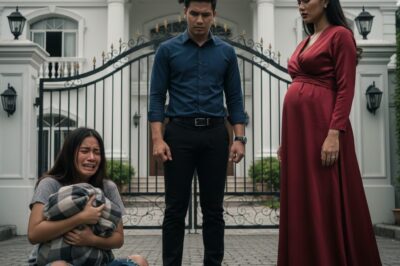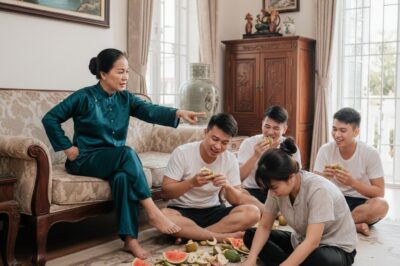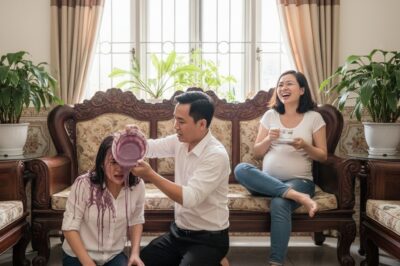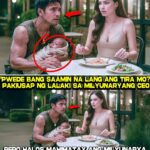
That night I stood on the porch, rain slapping my face like someone trying to pour clarity over my head, and I realized one thing: some cracks seem to come from the betrayer before you, but actually have been there inside you for a long time. Two years earlier I chose revenge—and thought I had won. But any victory built on sand will be washed away. And the wave of my life struck at the moment I felt safest.
My name is Linh. I was twenty-nine then, with a marriage that seemed peaceful, a small apartment with a window facing the river, and a close friend—Mai—who had been with me since college. We studied architecture together and left school onto different paths: I joined an interior design firm, while Mai married early and opened a small flower shop on a corner. My husband, Huy, was the quiet, gentle type. I trusted Huy the way people trust their own heartbeat: steady and faithful.
One evening I finished work late and returned to the apartment in a company car I’d borrowed because it was raining. The door wasn’t latched. I remember frowning: Huy never forgot to lock the door. In the dim patchwork of streetlight, I heard laughter—that laugh I knew so well—Mai’s. I stopped, my hand on the light switch but I didn’t turn it on. There was another light—faint, yellow, warm—leaking from the bedroom. I walked toward it, as if in a dream. The door was ajar, and the sight inside made the air in my lungs hollow out.
There was no shouting. No smashing. They just looked up, eyes wide. I looked at Mai first, then at Huy, as if they were strangers. I don’t remember what I said that night. I only remember leaving, driving in the rain, road water and tears mixing. I went to Mai’s flower shop—ironic, in hindsight—and sat numb in the dark among the unwrapped roses. My phone buzzed: a message from Huy: “I’m sorry.” A message from Mai: “Linh, I…” I switched the phone off.
Three days later, in a warped kind of clarity, I met Khang—Mai’s husband—at a café by the lake. Khang already knew. Not because Mai confessed, but because a blurry photo accidentally fell out of Huy’s wallet when Khang came to the apartment looking for Mai. Khang smiled—a smile like wind over broken glass. “What will you do?” he asked. I heard myself say something that, whenever I remember it later, makes me shiver and also feels like the turning point: “If they want to destroy everything, why should we stand still and watch?”
We didn’t plan much. A simple, clean revenge—like restoring balance by dropping in a matching stone. That night, Khang and I slept together. There was no love. No romance. Just two people clinging to the most primitive mechanism of pain: to make the other hurt as they had. In the morning, with the city wrapped in a bruise-gray sky, I felt the most terrifying thing: triumph. It rose from my chest like a fierce bird, beating its wings.
I went home and told Huy: “I know. And I did the same.” His face went white, then ashen. I imagined he would apologize, explain, plead. But Huy only nodded silently, as if accepting a sentence he felt he deserved. “Let’s live apart for a while,” I said. We split the house, the things, the time. Mai vanished from my life like a flower torn from its branch. Khang moved back to his parents’ house for a while.
Two years later I had changed jobs, gotten a promotion, moved to another apartment, grown Japanese grass on the balcony, and learned to make pour-over coffee. I believed everything was gradually normalizing. Then one afternoon I received a call from an unknown number. A woman’s voice, hoarse and slow: “Hello Ms. Linh, I’m Mai’s mother.” A short silence, then she continued: “Mai… didn’t make it. The doctors said a brain tumor. She hid it from everyone. Before she passed, she asked me to give you a letter.”
I sat motionless for a long time. The wave hit from an emptiness—not old remorse, not hatred. It came as a sudden, thunderlike question: if what we see is only the surface, then what had I been taking revenge on, and at what cost?
I received the letter on a rain-thick afternoon. Mai’s mother stood at the door, holding a canvas bag, eyes red. She handed me a white envelope, the corner worn. “She told me, if one day—” She stopped, swallowing—“—give this to you.” I invited her in, made tea, but neither of us drank. She sat very straight, dry thin hands folded on her knees like a prayer. When she left, the room felt so empty the tick of the clock seemed to break.
I held the envelope, scissors touching the paper. I thought of all the words I’d wanted to hear that would never come; all the questions that now seemed pointless. The paper unfolded; Mai’s handwriting leaned like a petal:
“Linh,
If you’re reading this, it means I broke my last promise: I couldn’t explain everything while I was still here. I know you might sneer: explain for what. But I still want to say it.
I was diagnosed with a brain tumor three years ago. At first it was small; the doctor said we could wait some time before surgery. I was scared. Scared of dying, of losing my mind, of watching life pass like slow motion. I hid it. I hid it from Khang and from you. I wanted to live like a normal person a little longer.
Huy was the first to know. Not because I intended to find him—by chance: that month the flower shop had few customers, I took on a floral design job for an interior project, and the person in charge was Huy. After the project, I fainted at a meeting. Huy took me to the hospital. From then on he checked on me, took me to scans, to appointments. I didn’t think much… until the first time I saw you, Linh. You and I were oddly similar and different. I wanted you to have someone to lean on when I… wasn’t there anymore. Sounds foolish, doesn’t it?
But things slipped away. One night when I panicked over worse scan results, Huy hugged me and told me not to be afraid. You know the rest. I won’t excuse myself. I betrayed you. I want you to know: part of it wasn’t desire or lack; it was fear and weakness. Maybe selfishness too: I wanted someone to see me not as a patient.
When you told me ‘I know’, I thought you would scold, slap me. You didn’t. You disappeared. I knew you were in so much pain you had no words. Weeks later Khang left the house. Our four worlds collapsed like a student model knocked off a desk. I deserved that.
But I heard you and Khang… I don’t know what I felt. I had no right. Just, Linh, that cycle of revenge doesn’t stop. It grinds everything to dust. Then one day, when you look back, you’ll find you’ve been ground down too.
I’m about to have surgery. The odds are not great. If I go, please don’t hate me more. Hate me a little less, as one forgives a fool. I left you the key to the bottom drawer of the wooden cabinet at the shop. Inside is a small box: some photos of us from college, and a notebook I never dared give you. I want you to keep them.
I’m sorry.
Mai.”
I read it over and over, each line like rain falling onto the empty floor. There were details I never knew: Huy taking Mai to appointments; Mai carrying a tumor for three years; the cabinet key. There were things I thought I knew but wasn’t sure of anymore: Huy’s reason, Mai’s reason, and even my own.
That evening I went to the flower shop. The metal shutter rolled up, dust lay like a thin film on the counter, on glass vases, on coils of ribbon. The wooden cabinet in the corner—exactly the kind Mai liked, dark wood and the faint smell of resin—clicked open with the key, a soft “tch” like a tongue clicking. The bottom drawer held an old cardboard box tied with string. Inside were photos: us in cheap plastic raincoats, laughing blurred in the hostel rain; us dozing over drawing tables; us on bus route 33 with hair tangled. There was a faded photo of us embracing in front of a chalk mural: “If we get lost, meet here.”
The notebook made me stop breathing. The first page read: “Things I want to tell Linh.” Then trivial lists: “The beef noodle stall you like,” “The day you said you wanted to go to Kyoto but never had time,” “When you’re sad, be quiet; don’t ask ‘are you okay?’—make ginger tea instead.” In the middle was a page written heavily, unevenly: “I’m scared, Linh. I’m scared you’ll see me fading. I want you to remember me as me.”
I sat in the flower shop under a yellow light. The city outside still buzzed, but inside I felt like I was sinking into a calm pool. I understood I had been seeing things as straight lines: betrayal → revenge → balance. But reality is a tangled web: illness, fear, caregiving, weakness, silence. I saw myself in the web, holding a little knife and cutting random strands, thinking cutting would free me. When the last strand dropped, I discovered I was hanging too.
I called Khang. We met by the lake like two years before, except the water now reflected the lights of a new building. Khang had lost weight, his eyes hollow from sleeplessness. I handed him the letter. He read, hands clenching at each paragraph. “I didn’t know,” he said, voice hoarse. “I truly didn’t know.” I nodded. “Nor did I.” We sat silent for a long time. Finally I said, “I want to stop this cycle.” Khang exhaled as if he’d just released a hard stone lodged in his throat: “Me too.”
But life does not halt for wishes. That’s when the second twist knocked—not with a storm, but quietly like a drip that erodes rock: I discovered I was pregnant.
The test showed two red lines. I stared at it like a strange signal from another planet. Dates ran backward in my head; the days aligned like stones in a flicking game—and then the silent wall of truth surfaced: the timing didn’t match Huy. It matched a night sealed by blurred memory and anger—the night I was with Khang. I slumped on the bathroom floor, back against the cold tile, and for the first time in two years I cried not from anger but from fear.
I told Khang at a humble fish-noodle stall, where people speak loud and laugh loud and the aroma of dill and broth masks bad news. Khang froze, the bowl in his hands suspended midair. He put it down and looked into my eyes, searching for an escape. “I… will take responsibility,” he said. The words dropped heavy between us. I shook my head: “No one can ‘take responsibility’ for a life by turning it into debt. If we do it, it must be because we want to.”
Our conversation was cut by a phone call: Huy. I hadn’t told him about Mai’s letter, about the pregnancy, about nights I’d been thinking of the word “forgiveness.” I arranged to meet him in the park. He arrived in his familiar moss-green coat, eyes rimmed dark. We sat on a bench. “I read Mai’s obituary,” Huy began. “I went to the funeral, but… I was afraid to see you.” I told him about Mai’s letter. Huy’s face tightened like a rough stitch into skin. “I was wrong,” he said. “Wrong from the start—by keeping Mai’s secret from you. I thought I was doing right: not making you worry. Then… everything got out of hand.” I nodded. Inside, a small balance wavered—not anger now, but the shadow of understanding.
I inhaled. “I’m pregnant.” Huy looked at me; his eyes trembled like a drop about to fall. He understood immediately. “It’s Khang’s,” I said. Huy nodded slowly. We both looked toward the lake where a pair of pigeons hopped. Finally Huy offered a wry smile: “Strangely… I feel lighter. As if this truth, though painful, is a door.”
The following days were a string of small decisions that accumulated into a silent earthquake. I went to the hospital for checks, clutching a black-and-white ultrasound like a shard of night sky with a tiny star. Khang waited in the corridor. When they checked the fetal heartbeat and that soft thrum hummed like the outskirts of a song, I looked at him. He cried. The man who had gone through divorce, betrayal, and that invisible mourning, now wept like a child. “I want to be a father,” he said simply and honestly. I felt another door open inside me.
I told Mai’s mother. She sat quietly and then took my hand. “Mai,” she said, “if she were here, she’d scold you for dragging yourself into trouble. But in the end she’d hug you and say: ‘Please don’t repeat my mistake; don’t let fear lead the way.’ Do you understand?” I nodded. I asked her if she hated me. She shook her head: “I hate illness. I hate silence. Not people.”
One morning I stood at Mai’s grave. The wind pushed the pampas grass in one direction. I laid down a bouquet of white chrysanthemums. “I won’t let fear lead me anymore,” I whispered. “I don’t dare ask you to forgive me. But I will live better so one day I can come here without bowing my head.” Only the rustle of wind and a slow drifting cloud answered.
Huy transferred to another branch. Before he left, he came to see me one last time. “I won’t disappear,” he said, “but I’ll give you space. If you need someone to carry boxes, fix an outlet, or just sit and listen to music, call me. Not out of obligation, but because what we shared was once real.” I hugged him—for the first time in two years—and closed a door that had been rattling too long.
Khang and I did not marry immediately. We took it slow like people relearning how to step on ground that had cracked. Khang moved into my apartment three nights a week, bringing along an old armchair he’d found at a flea market, saying, “so the child can sit and read later.” I smiled, imagining a small child curled in that armchair under afternoon sunlight.
Three months later I had a strange dream: Mai, Huy, Khang, and I standing by the sea. Waves lapped at our ankles up to our shins. Mai faced the ocean, smiling, her hair flying like white petals. “Don’t be afraid,” she said, her eyes free of pain. “The sea returns what it swallows, but in a different way.” I woke with my hand on my belly, tears wetting the pillow. I went to the kitchen, made a cup of warm milk, and waited for dawn like waiting for an old friend to come back.
The day my child was born it rained hard then cleared fast, like someone hurriedly washing the sky clean. I looked at the small wrinkled face, heard the tiny determined cry, and I understood: some chains of mistakes do not need erasing; they need transformation. I sent Huy a photo. He replied: “Congratulations to both of you. So adorable.” Khang held our child, his mouth forming the meaningless words only new fathers know how to make. Mai’s mother came and cradled the baby, pressing a kiss to my forehead. “What’s his name?” she asked. I said: “Bien”—Sea.
That night, when the hospital quieted to the soft soles of nurses’ shoes and the beeps of machines, I wrote a short note and placed it into Mai’s notebook: “I have weathered the wave, Mai. Not by fighting it, but by learning to float. If you were here, I believe you’d smile.”
A new life began without fanfare. I no longer wanted to win over anyone. I wanted to lay each small brick named trust, understanding, and the courage to speak the truth. Sometimes at night I hear the rain hit the roof and remember that old night—but instead of faltering, my heart is as smooth as water after a storm. I know what I will teach Bien first: if you drop something, don’t rush to pick up a stone to throw back. Bend down and see where you tripped. Sometimes what makes you fall isn’t the rock in front of you, but the tangled string inside you you haven’t untied.
And so the circle of revenge closed. Not with a knockout blow, but with a long, gentle exhale. What the waves take, they sometimes give back— in the form of a tiny life, a heart that learned courage, and a friendship, though shattered, that left behind a fragile light enough to guide rainy nights.
News
Naghiwalay kami. Inangkin ng ex-husband ko ang bahay sa pangunahing kalsada. Tinanggap ko ang wasak na bahay sa eskinita—ng araw na ipagigiba iyon, buong pamilya nila ay lumuhod sa lupa…/th
Ako si Hana, 34 taong gulang, dating asawa ni Eric—isang lalaking matagumpay, gwapo, at mahusay magsalita. Noong bagong kasal pa lang…
May sakit ang anak ko at kailangan ng pera. Pinuntahan ko ang dati kong asawa—itinapon niya ang isang punit na damit at pinalayas ako. Nang suriin ko iyon, nanigas ako sa nakita ko…/th
Ako si Lia, at halos dalawang taon na kaming hiwalay ni Daniel. Mabilis ang hiwalayan—walang luha, walang habol. Sumama siya sa bagong babae,…
Nang malaman ng biyenan ko na kumikita ako ng 50 milyon kada buwan, pilit niyang ipinauwi ang tatlong kapatid ng tiyuhin ng asawa ko mula sa bukid para tumira kasama namin—at inutusan akong pagsilbihan sila. Tahimik akong nagplano, at isang araw lang ang lumipas, may nangyaring hindi nila inasahan/th
Mula nang malaman ng biyenan ko na 50 milyon ang buwanang kita ko, biglang nagbago ang ugali niya.Wala nang panunumbat.Wala…
“Binuhusan ng asawa ang ulo ng kanyang misis ng bagoong para lang mapasaya ang keridang buntis daw ng anak na lalaki—ngunit hindi niya inakalang makalipas lamang ang sampung minuto, ang buong pamilya ng babae ang magpapakita ng isang matinding paghihiganti, na mag-iiwan sa kabit na walang kalaban-laban.”/th
Ang lalaking minsan kong tinawag na asawa—sa harap ko at ng babaeng kinakasama niya—ay biglang binuhat ang isang mangkok ng…
Namatay ang kuya kong may sakit sa pag-iisip — alam kong may naglason sa kanya…/TH
Ako si Andrea. Tanda ko pa noong 8 years old pa lang ako. Si Kuya Joel ay may sakit sa…
IKAKASAL NA KAMI BUKAS PERO BIGLA SIYANG NAWALA NA PARANG BULA/th
Ako si Joy. Bukas na sana ang kasal namin ni Marco. Nakaayos na ang lahat, ang simbahan, ang gown ko,…
End of content
No more pages to load












